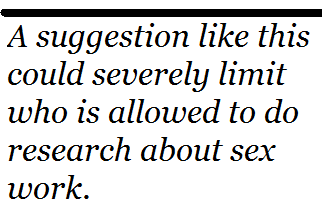FYI, Julie Bindel: Your Ideas About Sex Work Reseach Affect Sex Worker Students
Graduate students, sex workers: let’s talk. How would you like to get paid hundreds of dollars an hour for doing your boring project that nobody but you will ever read? OR how would you, sex workers, like to get a PhD for sucking cock?
According to abolitionist fearmongers, paradise has arrived. You can have all this and more, if you do sex work research.
Except.
Well, except that’s bullshit. But I needed a hook, ok? Because I’m about to get serious.
I try, less than successfully, to ignore the prostitution-related posts that come over the Policy Action Research Listserv (or PAR-L), a listserv for feminist activists, academics, professionals and others in Canada. I might have ignored an abolitionist’s post regarding Julie Bindel’s latest article smearing sex work organizations, except for the fact that the poster highlighted students’ participation in sex work as a concern raised by her paper.
 I responded on the listserv about the actual article and post topic — the inclusion of managers in sex worker unions (I’m against) — but the post stuck with me for the rest of the day. Sex workers’ access to education is an important issue, and it disturbs me how casual this attack was.
I responded on the listserv about the actual article and post topic — the inclusion of managers in sex worker unions (I’m against) — but the post stuck with me for the rest of the day. Sex workers’ access to education is an important issue, and it disturbs me how casual this attack was.
The poster to PAR-L commented as follows:
Bindel also raises important questions – and receives no answers – about the ethics of academic “participant observation”, i.e. students’ direct involvement with the sex industry.
Bindel’s discussion of the topic is somewhat more lengthy. She mentions that International Union of Sex Workers (a UK sex workers’ organization) co-founder Ana Lopes identifies herself as a “migrant sex worker.” Then she describes how Lopes decided to do her PhD research as a “participant observer” in either prostitution or phone sex — the article is a bit unclear about the timeline of Lopes’ sex work, saying at one point that
Lopes came to the UK from Portugal to study for a PhD. She, like a small but growing number of academics studying ‘sex work’ began to personally experiment with prostitution, thinking it akin to ‘field research’
and at another that
Lopes appeared to have been more interested in joining the sex industry than dismantling it. Soon after she began working with [IUSW co-founder Chris] Knight, Lopes signed up for shifts on a phone sex line.
and at another that
I ask if Lopes was granted permission from the University ethics committee to continue with phone sex work as part of her studies. According to [Lopes’ PhD supervisor, Dr.] Power, “Basic anthropology ethical guidelines” at the time.
 We’re not even going to talk about why Bindel thinks that last sentence is a sentence because that is not the most fucked up thing going on here. Did Lopes start working as a prostitute or a phone sex operator? Did she begin this work as research, or “continue” it as such? Maybe Bindel wrote this shit at 3 in the morning the day it went to press or something, but when I can’t understand the details of what should be a simple fucking timeline, I figure I’m getting bullshitted.
We’re not even going to talk about why Bindel thinks that last sentence is a sentence because that is not the most fucked up thing going on here. Did Lopes start working as a prostitute or a phone sex operator? Did she begin this work as research, or “continue” it as such? Maybe Bindel wrote this shit at 3 in the morning the day it went to press or something, but when I can’t understand the details of what should be a simple fucking timeline, I figure I’m getting bullshitted.
And as it turns out, I am!
In this interview for Workers Solidarity Movement, Lopes neatly describes her sex work and research experience:
My name is Ana Lopez from the International Union of Sex Workers (IUSW). I was one of the founders of IUSW. I was working as a sex worker in London when I finished my masters and wanted to start a PhD. Since I was working in this area, I decided that I would do research for my PhD within the sex industry. I don’t believe in science for science sake, I believe that any kind of research should be engaged and useful for the people you have studied. I started doing what we call strategic research, where you ask the people you want to study what they think is an interesting topic or area that needs to be studied and what kind of information they need to gather to respond to those needs.
So Lopes worked as a sex worker while finishing her MA, and since she was already doing sex work, decided to focus her PhD research on the topic, using methods informed by the wishes and priorities of her research participants. Sounds pretty standard.
So why does Bindel want to know about her ethics review?
For those outside the university, an ethics review isn’t exactly what the name implies. It doesn’t guarantee that research will be ethical. Rather, it helps to assure the university that their researchers aren’t going to get the institution sued. The general focus is on mitigating risks to research participants. The researcher is expected to show that whatever risks are undertaken are justified by the research question and methods, and to explain them in detail to participants, who give informed consent to be researched. Ethics review forms do ask about risks to researchers as well, but the primary focus is on participants’ imformed consent.
There are two questions that arise from Bindel’s demand for ethical review of Lopes’s research: does phone sex work pose a “risk” to the researcher? And what are the implications of subjecting sex workers doing research to special ethics review requirements?
It sounds like Lopes did not consider phone sex a particular risk to herself as a researcher. Maybe she’s very comfortable talking on the phone about sex. Or maybe she figured that if she heard anything upsetting, she could just hang up the phone. I don’t know, but honestly, as far as research-related risks go, I’m just not willing to call talking on the phone “risky,” short of institutional requirements that force me to do so.
But you know what is fucking risky? Expecting sex workers to undergo special ethics reviews by review committees who, often, are not feminists or labour experts or sex work experts.
A suggestion like this could severely limit who is allowed to do research about sex work. As we all know, sex work is about making money, so for anyone who is a sex worker because school is so goddamned expensive, the threat of job loss would effectively bar them from researching their own occupations. Or would special ethics restrictions only apply to students who get into sex work for research — the already-sullied are good to go, but the Research Ethics Board must defend the chastity of the non-whoring students? Would they “protect” other feminists and labour scholars from conducting autoethnographic research?
I’m writing a paper right this second using an autoethnographic approach to sex work research. It’s scary enough to write about sex, work, sexual assault, disability, stigmatization, fear, shame, coercion and the host of other issues that have cropped up, without subjecting myself to regulation and discipline by an institution that is fundamentally uninterested in sex workers’ rights. The kind of pressure Bindel suggests putting on sex workers — and the kind of pressure the PAR-L poster does put on sex workers by highlighting “students direct involvement with the sex industry” in an attempt to generate moral panic — would have a chilling effect on sex worker-led research and a negative impact on sex workers’ access to education.
To me, this sounds like a heck of a way for patriarchal, pro-capitalist institutions to silence research on the margins and research by the marginalized.
In short: fuck that shit, and fuck Julie Bindel for suggesting it.



3 comments